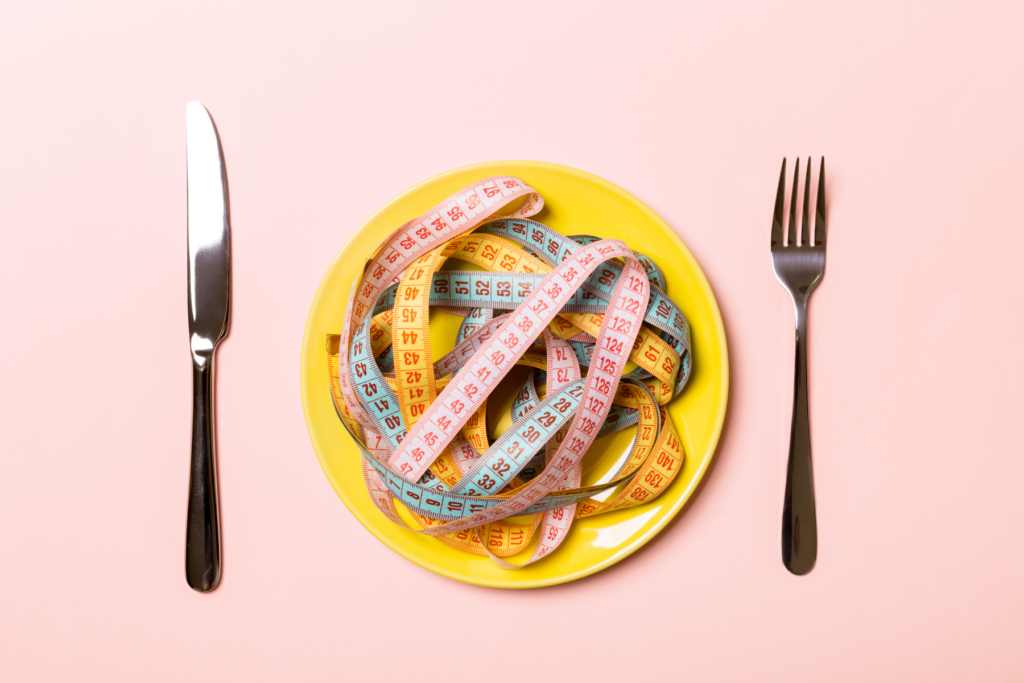Low-Calorie Diets: Are They Healthy?
February 14, 2022

Low-calorie diets are everywhere and I’m sure you’ve heard these before: Create a calorie deficit to lose weight. Don’t eat above 1200 calories per day. Cut 500 calories a day for easy weight loss. But, is it really that simple?
Low-calorie diets have become so normalized by diet culture, weight loss meal plans, and quick fix detoxes. However, despite their popularity, it doesn’t necessarily mean they’re helping you.
What is a Low-Calorie Diet?
First of all, what what is considered a low-calorie diet?
As a dietitian of 10+ years who mainly works with active women and athletes, my definition of low calorie is the following: a diet of less than 1800 calories per day, or a calorie deficit greater than 200-300 calories of your calculated needs.
What does a low-calorie diet look like? Here is an example of a low-calorie meal plan based on 1500 calories per day.
Are Low-Calorie Diets Effective?
Low-calorie diets are often prescribed for weight loss. They can be effective in creating weight change when eating less than you were previously. Thus, these diets are prescribed time and time again.
However, the problem with low-calorie diets isn’t necessarily the short-term results of weight loss. It is when we consider the long-term effects that we start to run into trouble. Low-calorie diets are often required to maintain weight loss beyond the short-term. The problem is, these diets don’t tend to be healthy or sustainable for long periods of time.
This often leaves us dietitians asking the question: “is weight loss even worth it for our clients in the end”?

Your Body on A Low-Calorie Diet
The use of dieting for weight loss, especially in people who fall within “healthy normal” weight, is a predictor of future weight gain and obesity. Yup, read that again. Dieting and weight cycling have been tied to excess weight regain and “fat overshooting” in otherwise lean individuals. If you’ve ever wondered why or how low-calorie diets cause weight gain, this is your answer.
Over 15 studies since the early 1990’s back this fact up. Included in these studies were a wide range of individuals: young and middle-aged adults, adolescents, and children. One study pointed out that adolescents who dieted were three times more at risk for obesity than non-dieters. A single episode of weight loss increased women’s risk of becoming overweight by three times, and men’s by two times. This was just before the age of 25!
Of course, genetic and familial effects can be at play in some of these cases. The role of dieting and weight cycling alone was studied in a group of power sport athletes. These sports (boxing, weight lifting, etc) often involve athletes undergoing weight cycling. The study occurred over 40 years and included athletes aged 20 to 60. The group in power sports showed a greater increase in their BMI during this time frame compared to the elite athletes not in power sports.
The Impacts of Low-Calorie Diets
So what’s the cause of all this?
Low-calorie diets, or what your body perceives as food deprivation, can have negative impacts such as: preocupation with food, food obsession, binge eating, mindless eating, disinhibition around food.
Studies on food deprivation and it’s resulting weight loss have identified a compensation response that occurs in the body. After a period of deprivation, the body regains more weight than what it even started with. The classic Minnesota Study by Keys et al. observed this response.
The study discovered that after the initial “semi-starvation” phase, food intake increased above the pre-starvation level. This increased intake persisted for several weeks beyond weight restoration. Body composition was negatively impacted as this weight overshooting mostly occurred as additional fat gain. This concept has been referred to as fat overshooting.

What Does Healthy Mean?
As a non-diet RD, I like to define health as a balance of the different areas of well-being. This can include physical, mental, social, occupational, and physiological health. It also means balancing these areas in a way that aligns with the life we want to live. Further, it includes taking into account the durability of our physical body over the long-term. Sounds complicated, right?
I like to define health this way for a few reasons:
- Health is often overly emphasized to be physical. Even though a big part of health is physical, it is also intertwined with other areas in our life. Can we really be physically healthy if we aren’t mentally or socially healthy?
- What health is may look different to each of us. To some of us, health is running a full marathon a few times a year. For others, its being able to run around with our kids and grandkids without feeling winded or easily tired.
- What is needed to be “healthy” has been too easily tied to the “obesity epidemic”. These BMI standards and concerns do not apply to all of us, and this topic should be treated lightly. There is a toxic culture around diet, fitness, and “obesity”. But, if we’re not careful, we may trade an obesity epidemic for an eating disorder epidemic…if we haven’t already.
Are Low-Calorie Diets Healthy?
Low-calorie diets are ineffective and potentially cause additional weight gain in the long-term. In addition, they can also lead to low energy availability issues.
Low energy availability results when energy intake isn’t enough to compensate for energy use. In other words, calorie intake is not enough to fuel body processes, daily activities, and exercise. As a result, an energy gap is created. Creating this gap is often the whole goal of low-calorie diets. Long-term, this gap in energy balance can result in gastrointestinal issues like gas and bloating. It can also cause irregular or missing periods, low energy levels, decreased training gains, and long-term cardiovascular, immune, bone and fertility issues unless corrected.
In summary, your body requires energy for many processes and daily tasks, including exercise. Certain systems are negatively impacted if there is not enough energy to go around. Your body is very resourceful and will do anything is can to survive on a daily basis. However, this doesn’t mean that your body, health, or fitness will be functioning optimally.

Key Takeaways
All in all, low-calorie diets are not supportive of your overall health and can do more damage than good.
Interested in learning more about how to eat healthy without low-calorie diets or calorie restriction? Check out our Fueled.Fit.Balanced program. This 1:1 program can help you confidently fuel your lifestyle without confusion, diets, or food rules. You deserve to feel your BEST both physically and mentally for the rest of your life.
Disclaimer: Despite the use of certain terms in this blog post, like BMI, overweight, and obese, ENW does not support the idea of BMI or that weight is equivalent to health. We work with all of our clients from a health at every size and performance at every size approach. We believe that with the right behaviors in place and knowledge, you can be healthy and confident at the weight that feels best for both you and your body.